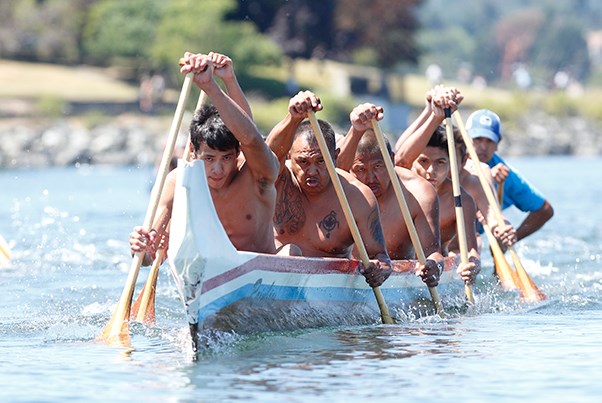Starting on September 16, the Vancouver Maritime Museum will present a new exhibition honouring the long history of canoe culture on the West Coast.
The exploitation of unceded First Nation territories continues to take place today. As environmental concerns grow and Indigenous rights continue to be disregarded, the need to share Indigenous ways of knowing and principles of stewardship has become urgent. Through this exhibition, the Vancouver Maritime Museum wants to provide a platform for Indigenous voices.
Canoe Cultures :: Ho’-ku-melh is a gathering of Indigenous artists and knowledge holders. In fact, the word Ho’-ku-melh is a Chinook Jargon term meaning “to gather.”
Curated by Roxanne Charles — a mixed media artist, contemporary storyteller, and a member of Semiahmoo First Nation in Surrey — the exhibition showcases the canoe, a vital element to coastal Indigenous life, and celebrates the resilience of Indigenous communities on the West Coast.
“The information carried forward in this exhibition offers museum-goers an opportunity to learn from the rich history of the lands and waters on which the museum is situated,” says Charles. “My hope is that this exhibition is empowering to Indigenous bodies, opens up conversations about Indigenous rights, and brings inspiration, desire, strength, and knowledge to those who visit.”
In this multi-sensory exhibition, Indigenous artists share their gifts as they explore climate change, food security, displacement, and ongoing colonialism through stories of the war canoe.
Canoe Cultures :: Ho’-ku-melh. Photo: Vancouver Maritime Museum.
After the implementation of the 1876 Indian Act in Canada, canoe racing was one of the only cultural practices that Indigenous people were still allowed to participate in. The race was a way to connect with the water systems which nurture the mental, physical, emotional, and spiritual health of Indigenous communities. Requiring intense training, the act of racing reminds participants to be in tune with each other and with nature.
“The War Canoe offers so much and is tied deeply to community health, well-being, land stewardship and activism,” shares Charles.
The exhibition also showcases the work of Canoe Cultures, a local Indigenous-led organization dedicated to the art and culture of the canoe. The Canoe Cultures program is an initiative led by seventh-generation skwxwu7mesh carver Mike Billy Sr. to teach young people to build war canoes.
With teachings for current and future generations, Canoe Cultures :: Ho’-ku-melh honours the culture of Salish peoples, recognizing the strength, resilience, stewardship, and generosity of the xʷməθkʷəy̓əm (Musqueam), sḵwx̱wú7mesh (Squamish), and sel̓íl̓witulh (Tsleil-Waututh) Nations and acknowledging the traditional village site of Sen̓áḵw (the place inside the head of False Creek).
“The Vancouver Maritime Museum is honoured to host this exhibition and to share Indigenous maritime traditions with our audience,” says Vancouver Maritime Museum Curator and Interim Museum Manager Duncan MacLeod.
For more information and to book tickets for the exhibition, visit vanmaritime.com/ho-ku-melh.



